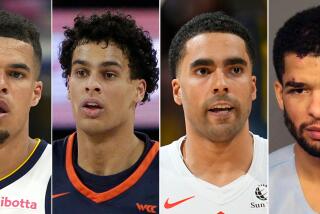Making His Point : Porter Gives the Trail Blazers a Different Breed of Lead Guard
- Share via
SALT LAKE CITY — Terry Porter is the starting point guard for the Portland Trail Blazers, and Danny Ainge is a reserve guard and resident entrepreneur with a T-shirt business that jumps on team fads so fast he had one out for rookie Robert Pack after his first five games.
Porter and Ainge are sitting next to each other in the visitors’ locker room at the Delta Center, talking about Porter’s game. Ainge supplies the needle.
“Gunner,” Ainge says.
Porter laughs. “Speaking of gunner,” he retorts.
Ainge already has a T-shirt in mind:
“Instant Offense, No Defense. Then have a picture of Terry. IOND. Instant Offense, No Defense.”
So it goes for Porter, the point guard who wasn’t one until he played in the NBA. Maybe he played some at a small high school in Milwaukee, where no one recruited him. Maybe some more at Wisconsin Stevens Point, a nonscholarship National Assn. for Intercollegiate Athletics school. But he was untested--at a position that relies so much on instinct--until his rookie year of 1985-86.
Teammates joke with him about being more of a scorer than a passer. It’s not natural.
But so little of Porter’s rise has been.
Dick Bennett watched Milwaukee South play one night so he could scout another prospect. His wife said, “You’d better watch that number 30.” That was Porter, who fouled out and scored seven points in a losing effort but left a positive impression.
“He had a feel for the game,” Bennett said.
Porter played with his head up. He covered for teammates while Milwaukee South was in a zone. And he was ambidextrous.
Bennett persuaded him to come to Stevens Point. Porter accepted, planning to play basketball, become the first member of his family to get a degree, work toward getting into radio or TV and maybe make it back to a market such as Milwaukee. He didn’t even dream of broadcasting in the NBA.
“Maybe do some local high school stuff,” he said.
Good thing, because Porter didn’t play much as a college freshman; Bennett was disappointed in his defensive intensity. But he became a starter as a sophomore and began to blossom. The real movement happened the next season, when the Pointers made the NAIA final before losing to Ft. Hayes (Kan.) in overtime.
Nobody would listen to a small-college coach talk about a 6-foot-2 junior who had been playing backup center, small forward and both guard positions. But the national tournament meant exposure for Porter.
Next thing he knew, the Olympic committee came calling, inviting him to the tryouts in Bloomington, Ind., for the 1984 team. The longest of longshots, a guy who would average 13.5 points in his college career, made it to the final 15 players before being sent home on the last day with chicken pox. He returned in hopes of playing in the Los Angeles Games, but got cut when Bobby Knight trimmed the squad a final time.
“The Olympic trial was big,” Porter recalled. “It was a huge opportunity for me to get down there and play against the guys. Those were the guys I used to watch with some of my teammates on the weekends on TV and hear all the announcers say how great they are. Michael Jordan to Patrick (Ewing) to Chris Mullin to Alvin Robertson to all the players on that team.”
Porter returned to Stevens Point for his senior year. His numbers were solid--19.7 points, 5.2 rebounds--but not flashy for someone who should be dominating that level to have realistic hopes of playing in the NBA. Interest from pro scouts was not overwhelming, so Bennett called Knight for help. Knight got Porter invited to the Aloha Classic, where he was defensive MVP and again proved he could compete against Division I talent.
Porter became regarded as a potential first-round selection in the summer of 1985. When draft day came, he and Bennett went to the Mecca, then home of the Milwaukee Bucks, and watched the proceedings with the Milwaukee media. After the hometown team passed on him in favor of Jerry Reynolds, Porter had to leave the room to compose himself.
The Trail Blazers were picking 24th and didn’t expect him to be around. They had him going to Houston or Boston and planned to take an area favorite from Oregon State named A.C. Green. But when Steve Harris went to the Rockets, the Celtics selected Sam Vincent and the Lakers took Green one pick before the Trail Blazers, Portland was thrilled to get Porter.
The Trail Blazers had Darnell Valentine and Steve Colter at point guard but were able to gamble on something of an unproven talent. The knowledge that a rising superstar, Clyde Drexler, was already in the backcourt provided the security. Porter provided the rest.
“You always have some concerns,” said Portland Coach Rick Adelman, an assistant to Jack Ramsay then and a former NBA guard himself. “But it was a situation, when he was first brought in, where he had great strength and he had good quickness--both defensively and offensively--and was a good passer. It was a matter of him working at it. And I didn’t have a doubt he would work at it. That’s just the way he is. He has made himself what he is.
“Almost every point guard in our league, the successful ones, have all played it throughout college. He’s the only guy that I know of who’s just made himself a point guard.”
He isn’t your average point guard. He played all 82 games, finished 35 assists behind Drexler. Porter was No. 2 in scoring at 18.1 points and was 12th in the league in three-point shooting.
Gunner.
It was not an average season, either. He lost his mother early in 1989-90, and Porter’s father died unexpectedly while Porter was in training camp. Porter’s start to the regular season was not really bad--46.8% shooting and 15.9 points the first 10 games--as inconsistent. And consistency has been one of his characteristics.
Contrast that with his finish. Porter averaged 23.1 points and made 43.8% of his three-pointers in April’s regular-season games. In the playoffs, he has been nothing short of sensational: 23.1 points, along with 53.5% from the field and 56.5% on three-point shots. He has a team-high 26.7 points against the Utah Jazz in the Western Conference finals, which continue today with Game 4, and the scoring has come largely at the expense of one of the NBA’s best defensive guards, John Stockton.
“That is the biggest thing, because of what started the year,” Porter said. “It’s tough to lose a parent, let alone two parents in such a short time. I think it’s so much of a mind-set, and coming to grips with it is so important. I think I’ve really done that well.”
Said Adelman: “These playoffs, we definitely have been trying to get him loose and get him going. If he’s aggressive offensively and he’s scoring, it makes us a much better team and makes a real threat for us. I think they (teammates) have been getting on him a little bit, but that’s OK. We’re going to try to ride him as long as we can.”
Porter laughs along with the chiding for his atypical point guard play, because he can. Success allows that: seven seasons in the NBA, having missed only nine games in that time, fifth on the Trail Blazers’ all-time list in games played, sixth in scoring, first in assists and second in steals.
It’s mostly because of that work ethic. He returns to Milwaukee three or four weeks every off-season to live with Bennett and work out. Like in the old days, much of the time is spent on defense. Three summers ago, during a stretch in Portland, Porter and Adelman spent two hours a day almost every day shooting three-pointers from every angle.
Bennett, now at Wisconsin Green Bay, has become something of a personal defensive coach. One day, he was criticizing a green freshman for not having enough intensity. The next, seeing the all-star on the cover of the Trail Blazers’ pocket schedule, he was calling to point out Porter had an unbalanced stance. His head was too far forward.
Porter listens, and learns. That’s the natural part.
More to Read
Go beyond the scoreboard
Get the latest on L.A.'s teams in the daily Sports Report newsletter.
You may occasionally receive promotional content from the Los Angeles Times.










